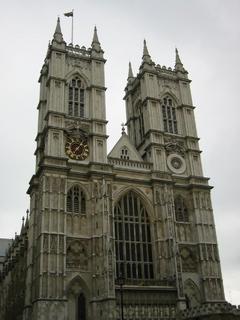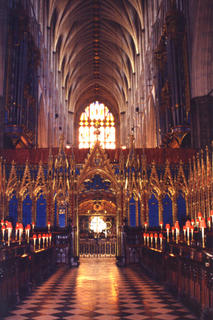The Confession begins with these lines:
Agreed upon by the Assembly of Divines (Theologians) at Westminster, with the assistance of commissioners from the Church of Scotland, as a part of the Covenanted Uniformity in Religion betwixt the churches of Christ in the kingdoms of Scotland, England, and Ireland.
From this alone we see the nature of uniformity and unity that the Standards were aiming for. The purpose is for the unity of the Christian church. These are the doctrines that all should be able to agree upon. Believe it or not, the more divisive and "unimportant" doctrines were not a part of the Standards. This is Christian unity. Amongst Presbyterians. Amongst Christians.


Two quotes concerning the Westminster:
As far as I am able to judge, the Christian world, since the dayes of the Apostles, had never a synod of more excellent divines than this. -Richard Baxter
The Westminster Standards are the richest and most precise and best guarded statement ever penned of all that enters into evangelical religion, and of all that must be safeguarded if evangelical religion is to persist in the world. -Benjamin B Warfield
12 comments:
This ties in nicely with what you were discussing the other night regarding churches setting up their own forms. Very well done.
I didn't know that they hadn't focused on devisive doctrines... I must admit I've never read the WMCOF all the way through. Do they ever discuss eschcatology? Love the pics Nate... we dummies need our pics!
Moey
I went through the Confession earlier this year and it is a great blessing for us right Presbyterians and the church as a whole. In going through it with the kiddos at ypcu I can see where it is going to bring our church together in better understanding Christ and His word.
It does go through eschatology. that doctrine is seen as an essential doctrine. (it may leave some more liberty than say Tim LaHaye would like)
Here are the chapters:
Chapter I - Of the Holy Scripture
Chapter II - Of God, and of the Holy Trinity
Chapter III - Of God's Eternal Decree
Chapter IV - Of Creation
Chapter V - Of Providence
Chapter VI - Of the Fall of Man, of Sin, and of the Punishment Thereof
Chapter VII - Of God's Covenant with Man
Chapter VIII - Of Christ the Mediator
Chapter IX - Of Free Will
Chapter X - Of Effectual Calling
Chapter XI - Of Justification
Chapter XII - Of Adoption
Chapter XIII - Of Sanctification
Chapter XIV - Of Saving Faith
Chapter XV - Of Repentance unto Life
Chapter XVI - Of Good Works
Chapter XVII - Of the Perseverance of the Saints
Chapter XVIII - Of the Assurance of Grace and Salvation
Chapter XIX - Of the Law of God
Chapter XX - Of Christian Liberty, and Liberty of Conscience
Chapter XXI - Of Religious Worship, and the Sabbath Day
Chapter XXII - Of Lawful Oaths and Vows
Chapter XXIII - Of the Civil Magistrate
Chapter XXIV - Of Marriage and Divorce
Chapter XXV - Of the Church
Chapter XXVI - Of the Communion of Saints
Chapter XXVII - Of the Sacraments
Chapter XXVIII - Of Baptism
Chapter XXIX - Of the Lord's Supper
Chapter XXX - Of Church Censures
Chapter XXXI - Of Synods and Councils
Chapter XXXII - Of the State of Men after Death, and of the Resurrection of the Dead
Chapter XXXIII - Of the Last Judgment
I'm a bit fuzzy on my church history, but I don't think that eschcatology was a major issue when the Standards were written.
In the URC we had an issue a while back with a pastor who they refused to ordain because he held to padeocommunion. It's just not addressed in the Three Forms, which is no fault of the authors of course.
The Westminister guys drew up their Cambridge Declaration a few years back. I've my issues with those guys on some things, but I think that to a certain degree it's helpful make new creeds. Of course, in the current atmosphere such a thing would more likely than not be abused. (Article XII : On Excommunicating Those Who Celebrate Special Days, Article IXVIII : On Getting Our Backs Up At the Word "Theonomy", and so on.)
Eschatology was an issue. If you read the Savvoy Declaration you will see that it was so.
In the Savvoy there were two issues that these theologians left Westminster over.
1. Congregational church government
2. A more "radical" post-millennialism than that at Westminster.
There stand on Eschatology is a bit more focused in my opinion than Westminster, but Westminster is essential.
I bow to your superior knowledge.
Hey Nate, come join the insanity over on James' brog.
escatology, i think the westminster guys view is summed in the 2nd petition of the Lord's prayer in the larder catechism. Definitely POST mil.
Q. 191. What do we pray for in the second petition?
A. In the second petition (which is, Thy kingdom come), acknowledging ourselves and all mankind to be by nature under the dominion of sin and Satan, we pray, that the kingdom of sin and Satan may be destroyed, the gospel propagated throughout the world, the Jews called, the fullness of the Gentiles brought in; the church furnished with all gospel officers and ordinances, purged from corruption, countenanced and maintained by the civil magistrate; that the ordinances of Christ may be purely dispensed, and made effectual to the converting of those that are yet in their sins, and the confirming, comforting, and building up of those that are already converted: that Christ would rule in our hearts here, and hasten the time of his second coming, and our reigning with him forever: and that he would be pleased so to exercise the kingdom of his power in all the world, as may best conduce to these ends.
Also, check out WCF ch 25 section 6 which is decidedly historicist
"There is no other head of the Church, but the Lord Jesus Christ; nor can the Pope of Rome, in any sense, be the head thereof; but is Antichrist, that man of sin, and son of perdition, that exalteth himself, in the Church, against Christ and all that is called God."
What's really sad is that so many use the Standards (which were written, as you say, to unify) to create division and schism within the church. How far they are from the original intents of the Divines they quote so fervently!
i agree that they are post mil too.
savvoy is alsp post, but more obviously so.
Nice topic, Nate. I will be posting soon on a similiar topic.
Interesting that all of the standards begin with the same title, "Agreed upon by the Assembly of Divines (Theologians) at Westminster, with the assistance of commissioners from the Church of Scotland, as a part of the Covenanted Uniformity in Religion betwixt the churches of Christ in the kingdoms of Scotland, England, and Ireland."
You also mentioned, "From this alone we see the nature of uniformity and unity that the Standards were aiming for." That's right, the "Covenanted" Uniformity!
It was no accident that this assembly produced the works that it did, since they promised to.
"That we shall sincerely, really, and constantly, through the grace of GOD, endeavor, in our several places and callings, the preservation of the reformed religion in the Church of Scotland, in doctrine, worship, discipline, and government, against our common enemies; the reformation of religion in the kingdoms of England and Ireland, in doctrine, worship, discipline, and government, according to the Word of GOD, and the example of the best reformed Churches; and shall endeavour to bring the Churches of GOD in the three kingdoms to the nearest conjunction and uniformity in religion, Confession of Faith, Form of Church Government, Directory for Worship and Catechising; that we, and our posterity after us, may, as brethren, live in faith and love, and the Lord may delight to dwell in the midst of us." - Solemn League and Covenant, Paragraph 1.
You posted some great quotes. Here are a couple of William Hetherington's. His book can be found free at:
http://www.reformed.org/books/
hetherington/west_assembly/
But the man who penetrates a little deeper into the nature of those unrevealed but powerful influences which move a nation's mind, and mould its destinies, will be ready to direct his attention more profoundly to the objects and deliberations of an assembly which met at a moment so critical, and was composed of the great master-minds of the age; and the theologian who has learned to view religion as the vital principle of human nature, equally in nations and in the individual man, will not easily admit the weak idea, that such an assembly could have been an isolated event, but will be disposed earnestly to inquire what led to its meeting, and what important consequences followed. And although the subject has not hitherto been investigated with such a view, it may, we trust, be possible to prove, that it was the most important event in the century in which it occurred; and that it has exerted, and in all probability will yet exert, a far more wide and permanent influence upon both the civil and the religious history of mankind than has generally been even imagined (p. 17).
There was one great, and even sublime idea, brought somewhat indefinitely before the Westminster Assembly, which has not yet been realized, the idea of a Protestant union throughout Christendom, not merely for the purpose of counterbalancing Popery, but in order to purify, strengthen, and unite all true Christian churches, so that with combined energy and zeal they might go forth, in glad compliance with the Redeemer's commands, teaching all nations, and preaching the everlasting gospel to every creature under heaven. This truly magnificent, and also truly Christian idea, seems to have originated in the mind of that distinguished man, Alexander Henderson. It was suggested by him to the Scottish commissioners, and by them partially brought before the English Parliament, requesting them to direct the Assembly to write letters to the Protestant Churches in France, Holland, Switzerland, and other Reformed Churches. . . . and along with these letters were sent copies of the Solemn League and Covenant, a document which might itself form the basis of such a Protestant union. The deep thinking divines of the Netherlands apprehended the idea, and in their answer, not only expressed their approbation of the Covenant, but also desired to join in it with the British kingdoms. Nor did they content themselves with the mere expression of approval and willingness to join. A letter was soon afterwards sent to the Assembly from the Hague, written by Duraeus (the celebrated John Dury), offering to come to the Assembly, and containing a copy of a vow which he had prepared and tendered to the distinguished Oxenstiern, chancellor of Sweden, wherein he bound himself 'to prosecute a reconciliation between Protestants in point of religion'. . . . [O]n one occasion Henderson procured a passport to go to Holland, most probably for the purpose of prosecuting this grand idea. But the intrigues of politicians, the delays caused by the conduct of the Independents, and the narrow-minded Erastianism of the English Parliament, all conspired to prevent the Assembly from entering farther into that truly glorious Christian enterprise. Days of trouble and darkness came; persecution wore out the great men of that remarkable period; pure and vital Christianity was stricken to the earth and trampled under foot. (pp. 337-339).
Post a Comment